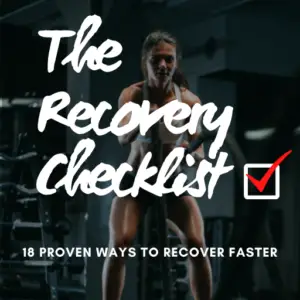Sleep for weight loss sounds too good to be true. Sure, sleep is underrated.
Great sleep is essential and we can’t function at 100% without it. However, many people don’t understand sleep’s profound effect on fitness, physical health and mental well-being.
So what does science say about sleep and weight management? Is “sleep for weight loss” a science-backed strategy?
The short answer is YES.

Here’s what science says:
Sleep for Weight Loss
Scientists examined the sleep and weight loss relationship in this 2010 study. Researchers split the participants into two groups.
Both groups ate a moderate calorie deficit. Group 1 slept 8.5 hours per night and Group 2 slept 5.5 hours per night.
The sleep-deprived group retained 55% more body fat. Instead, they lost muscle – 60% more lean body mass (i.e. muscle & bone mass) than the well-rested Group 1.
In short, fat loss is harder when you’re sleep deprived. When you’re sleep-deprived and dieting, your body is more apt to burn muscle.
Adequate sleep improves obesity interventions, concluded a 2012 literature review.
Hormones and Willpower
Why does poor sleep make it harder to lose weight? Scientists blame 3 mechanisms (and I included a 4th):
1. Poor Impulse Control
We make worse decisions when we’re sleep-deprived. Poor dietary decisions translate to more fast food, salty food and fatty food.
Plus, it’s harder to say no to sweets. If you do give in to your sweet tooth, be smart about it – select one of the best times to eat candy.
2. Leptin and Ghrelin
These two hormones regulate appetite. Leptin makes you feel satiated after a huge home-cooked meal. Leptin is your appetite’s brake pedal. Ghrelin is the gas pedal, driving hunger and increasing your appetite.
When you don’t sleep enough, leptin levels plummet and ghrelin skyrockets. Your appetite grows and your body needs more food and calories to feel full.
For example, do you ever feel ravenous after waking up at 3 AM to catch an early flight? Or am I the only one who does this at the airport?

3. Cortisol
Insufficient sleep elevates cortisol, a major stress hormone. So poor sleep stresses us out. And if you’re like me, you eat chips and ice cream when you’re stressed out (in separate dishes, of course).
Plus, stress literally slows down healing. The research is mind-boggling: Mouth Wounds and Stress
4. Longer Feeding Window
An under-recognized downside to sleeping less – there is more time to eat. Unless you’re my 7-month-old son, it’s tricky to eat while you sleep. A popular diet strategy uses truncated feeding windows to reduce daily food intake – with controversial outcomes.
Intermittent fasting relies on short feeding windows to restrict calorie intake. Many people find intermittent fasting creates an ideal weight loss environment.
Personally, intermittent fasting has helped me shed body fat better than other strategies I have attempted. Learn more about this hotly debated nutrition strategy: The Truth About Intermittent Fasting
Sleep is Like Oil
Sleep for weight loss is like oil for your car’s engine. Too little sleep – or oil – will stall your progress and make it a bumpy ride.
But if you already topped off, adding more won’t make your weight loss, or your car, faster.
The Verdict
Quality sleep is essential for weight management. Poor sleep makes weight loss grueling. And weight loss achieved on insufficient sleep is a Pyrhhic victory because it stems from muscle tissue loss; body fat is retained.
Most adults need 7 to 9 hours of sleep every night, according to the experts at the National Sleep Foundation. If you sleep fewer than 7 hours a night and struggle with weight management, don’t overlook better sleep as a pathway to better health.
To learn how to upgrade your sleep, check out the Facts & Physio mega-guide to better sleep: 28 Tips for The Best Sleep of Your Life
Readers: How much sleep do you need to feel rested? Are you surprised that poor sleep and weight gain are closely connected? Have you seen a correlation between sleep and weight management in your life? Share your thoughts in the comments.
For more evidence-based health tips, join the free Facts & Physio Newsletter. Plus, get The Recovery Checklist when you sign up.

